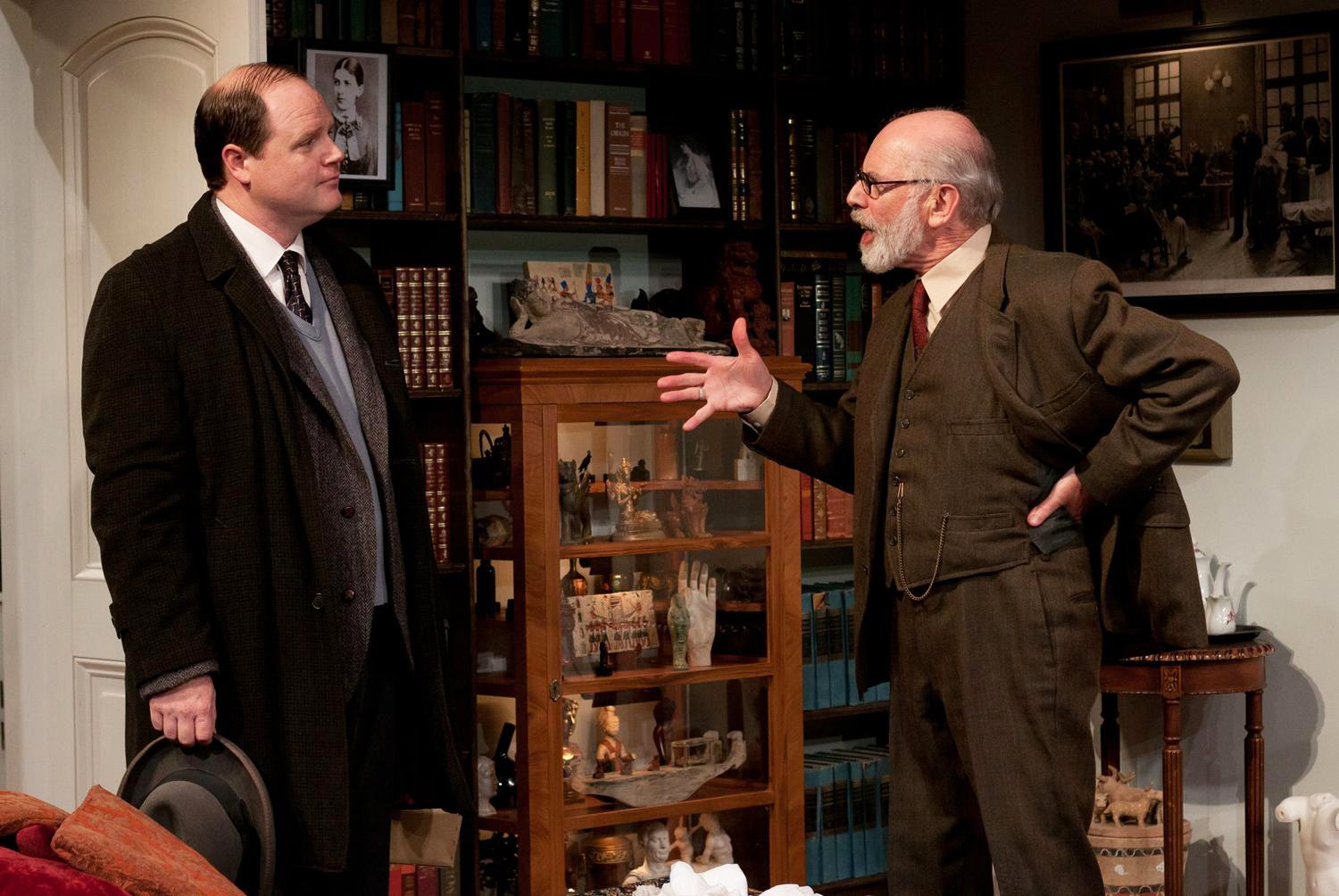
Freud’s Last Session by Mark St. Germain. Arden Theatre, 2012
*
Sigmund Freud, father of psychoanalysis, age 83 and dying from oral cancer, has invited the 40-year-old author and Oxford don C.S. Lewis to his London home. Lewis was a former atheist who subsequently embraced Christianity and became its advocate and polemicist. Freud, by contrast, had written that religion was a neurosis and God an illusion based on humans’ infantile need for a powerful father figure.
The date is September 3, 1939, the day on which England responds to Nazi Germany’s invasion of Poland by declaring war. And it’s just three weeks before Freud’s medically-assisted death.
Early in their fictitious meeting, as imagined by the playwright Mark St. Germain in Freud’s Last Session, Freud wonders how an intelligent man like Lewis can “abandon truth and embrace an insidious lie” like religion. The two men disagree on this issue as well as a host of other subjects.
Their clashes turn acrimonious when Lewis questions sexual aspects in Freud’s relationship with his daughter Anna, while Freud alleges a sexual attraction between Lewis and his best friend’s mother, who moved in with Lewis after the youth’s death in World War I. (Lewis routinely introduced her as his mother.)
As someone who respects the role of religion in life and finds comfort in many of its rituals, I expected to be partial to Lewis’s arguments — especially since Lewis is presented here as a rational man who questions his beliefs every day, only to repeatedly find God everywhere around him.
Unfortunately, this theoretically-minded Christian produces no proof of his beliefs. Freud, on the other hand, presents strong evidence of an absence of God: The Nazis’ persecution of Jews; Freud’s painful illness; and, finally, the unleashing of World War II.
My sympathy was tipped further toward Freud by Lewis’s apparent disrespect for Freud. In the Arden production, Todd Scofield as Lewis is not only younger and stronger than Freud but also much larger and intimidating.
St. Germain also gives Freud the best laugh lines: “No sex before marriage? It’s not only naive, it’s mindless cruelty. Like sending a young man off to perform his first concerto with an orchestra when the only time he’s ever played his piccolo was alone in his room.”
“This is something it would be better to read than to see on stage,” I heard an audience member remark after the house lights came on. She had a point. St. Germain’s script is indeed wordy and densely packed. But there’s great drama in the interaction of two men with conflicting ideas, circling each other, ready to pounce while Freud, suffering from oral cancer, continues to smoke cigars.
The set itself, by David P. Gordon, functions as a dramatic force. It’s a detailed replica of Sigmund Freud’s study in London, its tall cases filled with books, Asian textiles, Egyptian amphoras, Greek and Indian statues, all evidence of Freud’s diverse interests and relentless hunger for knowledge. Ian Merrill Peakes directed clearly.
David Howey as Freud and Todd Scofield as Lewis were powerfully convincing as the adversaries. Jorge Cousineau contributed strongly with his sound design, which incorporated airplanes that seemed to fly over the theater, air raid sirens and BBC war broadcasts, culminating in King George VI’s address to the British nation at the outset of the war. It’s as powerful here as it was in the film The King’s Speech.
Read more reviews on The Cultural Critic